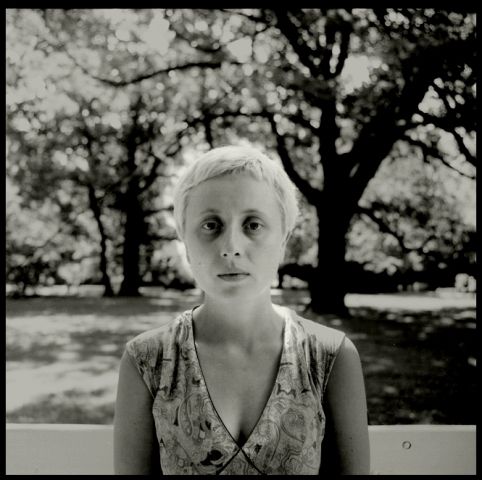about the production
Chekhov’s dramas, as all canonical dramatic texts, provoke new readings, but in this case it should be written: they are reincarnated in new readings. It is because Agnieszka Olsten already wrote into the (ironic) title of her production, based on her own interpretation of Ivanov, a Sanskrit word “samsara”, denoting an endless journey. As the 20th century showed, the tradition of the inter-cultural reading of dramatic texts can clarify their before unseen aspects. As with every good production – you do not have to know or profess eastern philosophies in order to penetrate into the world of the Samsara disco characters. In a simple, minimalist production we watch provincial society of today’s world of globalized ideas, beliefs and values from which, despite their variety and diversity, the leading character Ivanov is unable or unwilling to choose. The Chekhov’s drama is interpreted through Victor Pelevine’s novel The Life of Insects. Through the Pelevin’s images, by the metaphor from literature to philosophy of the Far East, she enriches Chekhov’s strictly “European” psychological analysis of man. Pelevin’s view on man is close to Buddhism.
Such reading of the text gives the “Ivanovian” blundering in the circle, often interpreted as a middle age crisis, a new dimension. Thanks to its passiveness, not intervening into particular actions, the play between Ivanov and his surroundings valuably balances. By this, in a slow pace of the production, a more colourful palette of stories of other characters is played, characters who when interpreted traditionally only assist to Ivanov. The world of the whole play gains more complicated and complex motivations and each character can be watched in a finer analysis of their conduct.
The text serves only for the base, the most important things happen on the stage action. The production of Agnieszka Olsten is a real psychological study. The gestic world of the characters and the mis-en-scenes will not remind you of any Ivanov you have ever seen, you will be confronted with the real result of the journey of deep and sincere search and depicting of characters by concrete actors. For such quality the reviewers of the production use often a term “a generation testimony”, but more precise would be “a group psycho-physical testimony about Ivanov”, however clumsily and sectarian it may sound. Olsten does not offer any collective therapeutic experience of Grotowski’s shape; her stage search is closer to the work of Krystian Lupa. On the stage she can stop or slow down banal, every-day situations in order to uncover in them, in a normal pace, unseen details and by this to show that even also the endless repetition of the same figure uncovers the unsuspected, and that it is the repetition which brings us the opportunity to find something new, and that only in the repetition there is peace hidden.
Ján Šimko
creators
script: Agnieszka Olsten & Bartosz Frąckowiak
direction: Agnieszka Olsten
dramaturgy: Bartosz Frąckowiak
set designer: Joanna Kaczyńska
lighting designer: Wojciech Puś
music: Marcin i Bartołomiej Brat Oleś
choreography: Tomasz Wygoda
project coordinator: Hanna Frankowska
characters and cast: Borkin, Mitya: Mirosław Haniszewski, Lebedev: Maciej Kozłowski (guest appearance, actor of National Theatre in Warsaw) Wojciech Ziemiański, Dima: Marcin Czarnik, Anna, Sara: Katarzyna Strączek, Ivanov: Michał Majnicz, Count: Tomasz Wygoda (guest appearance), Sasha, Natasha: Dagmara Mrowiec, Zinaida Savishna, Marina: Bożena Baranowska, Babakina, Marina: Anna Ilczuk, Lvov: Jakub Giel
director

Agnieszka Olsten (1977) studied directing at the Academy of Drama and Theatre in Warsaw. She also studied journalism and worked as a radio reporter. She is the founder and the first director of the Collegium Civitas Theatre in Warsaw. She is also the founder and a member of the Drama - the theatrical and dramaturgical association at the Ateneum Theatre in Warsaw whose aim is to promote and support contemporary Polish drama. Her directions, acclaimed by critics as well as viewers, are daring, controversial and disturbing, and, primarily, dealing with the most appalling problems of today’s society.
Agnieszka Olsten also writes scripts and considerably adapts texts of other authors. Her most important works are: Oxygen (after Ivan Vyrypaev), Solo (she wrote it with Andrzej Stasiuk and it is a testimony of a man sentenced to death), Abundance (a prolicidal play) after Izabela Wasińska, Henrik Ibsen’s Nora at the National Theatre in Warsaw etc. We met her twice at the Divadelná Nitra: in 2005 she dramatised RIMINI PROTOKOLL’s text entitled Sabenation (Go Home and Follow the News) within the OFF Programme, and in 2007 she represented Poland by contributing in the seven-countries project named Middentity – identify.middle.eu, prepared and produced by the Divadelná Nitra, where she presented a video-projection entitled Panties.
Materials available
Script of the production: SK, EN, PL
If you are interested in these materials, write to archivy@nitrafest.sk
